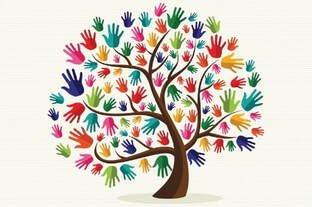Interfaith dialogue, the communication and cooperation between people of different religious traditions, plays a vital role in fostering understanding, tolerance, and peace. Islam encourages such dialogue, emphasizing the importance of mutual respect and collaboration. This article explores the significance of interfaith dialogue in Islam, supported by Quranic and Hadith evidences, and highlights its benefits for society.
The Significance of Interfaith Dialogue
Interfaith dialogue is essential in promoting harmony and understanding among diverse communities. It helps dispel misconceptions, reduce prejudices, and build relationships based on respect and common values.
Quranic Evidence:
“يَا أَيُّهَا النَّاسُ إِنَّا خَلَقْنَاكُم مِّن ذَكَرٍ وَأُنثَىٰ وَجَعَلْنَاكُمْ شُعُوبًا وَقَبَائِلَ لِتَعَارَفُوا إِنَّ أَكْرَمَكُمْ عِندَ اللَّهِ أَتْقَاكُمْ إِنَّ اللَّهَ عَلِيمٌ خَبِيرٌ”
“O mankind, indeed We have created you from male and female and made you peoples and tribes that you may know one another. Indeed, the most noble of you in the sight of Allah is the most righteous of you. Indeed, Allah is Knowing and Acquainted.”
(Quran 49:13)
Hadith Evidence:
“قَالَ رَسُولُ اللَّهِ ﷺ: أَفْشُوا السَّلَامَ وَأَطْعِمُوا الطَّعَامَ وَصِلُوا الْأَرْحَامَ وَصَلُّوا بِاللَّيْلِ وَالنَّاسُ نِيَامٌ تَدْخُلُوا الْجَنَّةَ بِسَلَامٍ”
“The Messenger of Allah (ﷺ) said: ‘Spread peace, feed the hungry, maintain family ties, and pray at night when people are sleeping, and you will enter Paradise in peace.'”
Principles of Interfaith Dialogue in Islam
- Respect and Tolerance: Islam teaches respect for all human beings, regardless of their faith. This respect is fundamental in interfaith dialogue.
- Common Ground: Focusing on shared values and beliefs helps build strong relationships and fosters mutual understanding.
- Sincerity and Honesty: Honest and sincere communication is crucial in building trust and respect among different faith communities.
- Peaceful Coexistence: Islam promotes peaceful coexistence and encourages Muslims to engage with others in a manner that promotes peace and harmony.
Quranic Evidence:
“وَلَا تَجَادِلُوا أَهْلَ الْكِتَابِ إِلَّا بِالَّتِي هِيَ أَحْسَنُ إِلَّا الَّذِينَ ظَلَمُوا مِنْهُمْ ۖ وَقُولُوا آمَنَّا بِالَّذِي أُنزِلَ إِلَيْنَا وَأُنزِلَ إِلَيْكُمْ وَإِلَٰهُنَا وَإِلَٰهُكُمْ وَاحِدٌ وَنَحْنُ لَهُ مُسْلِمُونَ”
_”And do not argue with the People of the Scripture except in a way that is best, except for those who commit injustice among them, and say, ‘We believe in that which has been revealed to us and revealed to you. And our God and your God is one; and we are Muslims [in submission] to Him.'”
(Quran 29:46)
Benefits of Interfaith Dialogue
- Promoting Peace: Interfaith dialogue helps in resolving conflicts and promoting peace among different communities.
- Building Relationships: It fosters friendships and understanding between people of different faiths.
- Educational Growth: Engaging in dialogue with people of other faiths provides an opportunity to learn about their beliefs, practices, and perspectives.
- Social Cohesion: It strengthens the social fabric by promoting inclusivity and reducing prejudices and stereotypes.
- Spiritual Enrichment: Understanding and respecting other faiths can enhance one’s own spiritual journey and promote a broader perspective on faith and humanity.
Hadith Evidence:
“قَالَ رَسُولُ اللَّهِ ﷺ: لَا يُؤْمِنُ أَحَدُكُمْ حَتَّى يُحِبَّ لِأَخِيهِ مَا يُحِبُّ لِنَفْسِهِ”
“The Messenger of Allah (ﷺ) said: ‘None of you will believe until you love for your brother what you love for yourself.'”
Quranic and Hadith References:
- Quran: Surah Al-Hujurat (49:13), Surah Al-Ankabut (29:46)
- Hadith: Sahih Muslim, Sahih Bukhari








